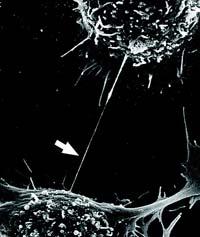Nanotubes for intercellular communication

Researchers at the University of Bergen discover that electrical communications occur between different types of cells. So far this type of communication was only known in heart and brain cells. Cells use cables or nanotubes made up of actin proteins and gap bonds (junction points between cell membranes) to communicate with each other.
A researcher who has participated in the study has stated that it is also possible to communicate cells at a distance using this pathway. In experiments, for example, nanotubes can be longer than the union of the widths of some cells. And among the cells that use this communication strategy, they have seen that the GIB-1 virus can circulate through the intercellular nanotubes of the immune system, as well as the prions by the tubes that bind neurons.





